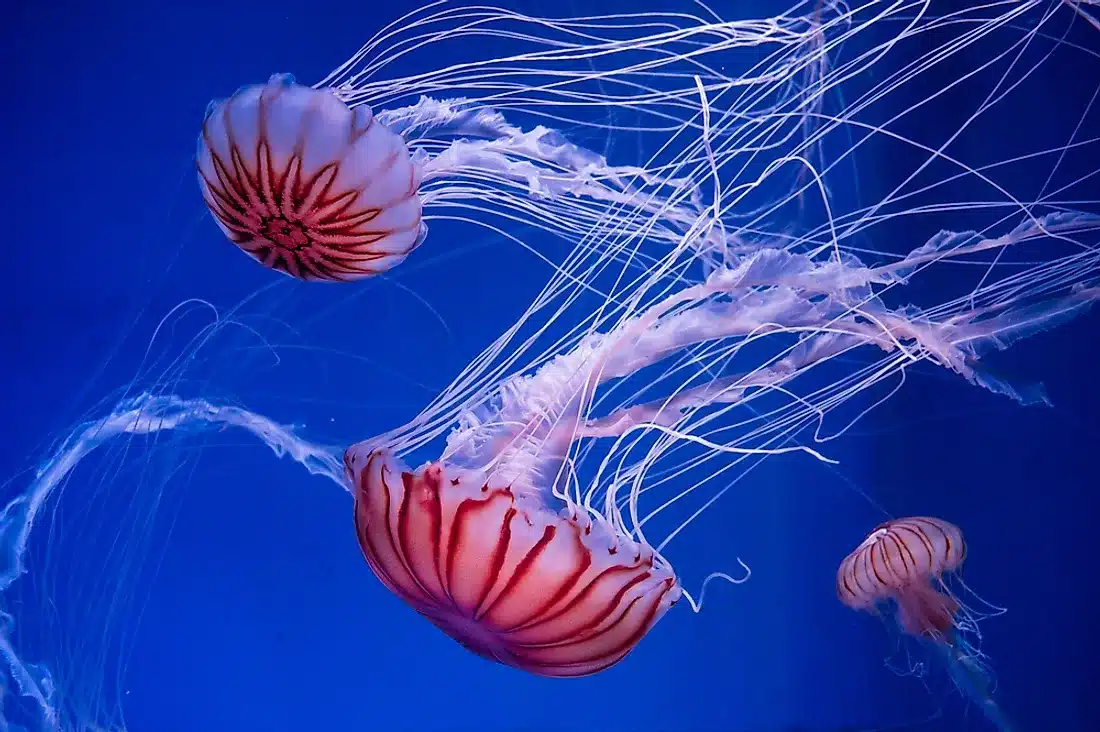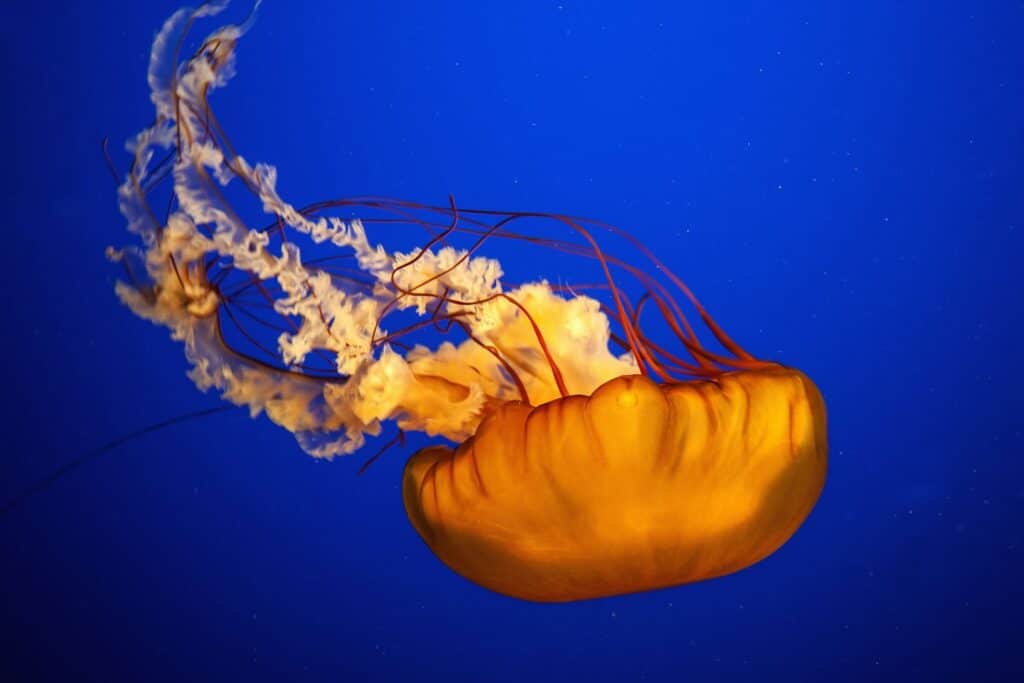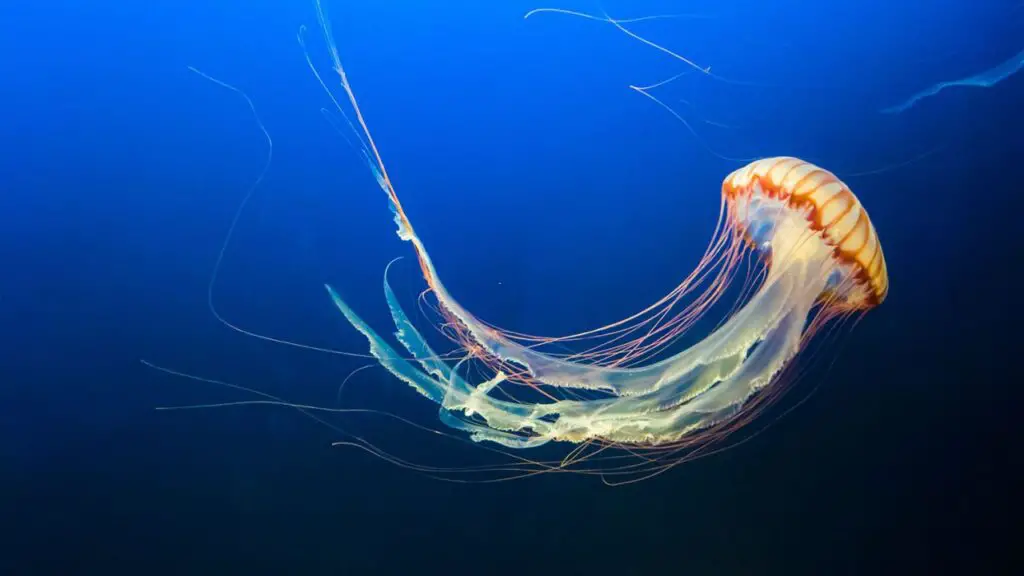Are Jellyfish Smart

Introduction
Are Jellyfish Smart: Jellyfish live, those gracefully drifting, gelatinous creatures that populate the world’s oceans, have long captivated the human imagination. Often regarded as simple and primitive beings, jellyfish have been overshadowed by the more charismatic intelligence of dolphins, octopuses, and other marine life forms.
Traditionally, intelligence has been measured in terms of cognitive abilities such as problem-solving, learning, and memory – qualities that seem far removed from the ethereal world of jellyfish. But as we delve deeper into the mysteries of these seemingly alien creatures, we discover that their apparent simplicity masks a remarkable adaptability and a unique set of behaviors that suggest a level of intelligence previously underestimated.
In this exploration, we will embark on a journey to uncover the intricacies of jellyfish intelligence. We will delve into their sensory perception, their capacity for navigation, and their responses to environmental changes. By peering into the world of jellyfish, we hope to shed light on the fascinating and often overlooked aspects of their existence, challenging our preconceived notions about what it means to be intelligent in the animal kingdom.

How intelligent is jellyfish?
Jellyfish are much smarter than previously thought, reveals new research. The study showed that poisonous Caribbean box jellyfish can learn at a far more complex level than ever imagined – despite only having 1,000 nerve cells and no centralized brain.
The intelligence of jellyfish is a subject of ongoing scientific inquiry and fascination. While jellyfish lack the complex brains of mammals and some other marine species, they exhibit a remarkable level of adaptation and survival strategies that hint at a form of intelligence uniquely suited to their environment. Their abilities to sense changes in their surroundings, navigate ocean currents, and respond to various stimuli showcase a level of sophistication that challenges traditional definitions of intelligence.
Jellyfish exhibit an impressive array of sensory structures, including specialized cells that can detect changes in light, temperature, and salinity. These sensory abilities allow them to perceive their environment and make informed decisions about when and where to move, seek prey, or avoid predators. Additionally, some jellyfish species exhibit intricate behaviors such as swimming patterns and hunting techniques that suggest a capacity to learn and adapt over time.
While their intelligence may not align with human cognition, the enigmatic world of jellyfish intelligence continues to intrigue researchers, pushing the boundaries of our understanding of what it means to be smart in the context of the diverse and mysterious life forms that inhabit our oceans.
How smart is a jellyfish?
“It is a surprise that a jellyfish — an animal normally considered to be lacking both brain and advanced behavior — is able to perform visually guided navigation, which is not a trivial behavioral task,” said lead researcher Anders Garm of the University of Copenhagen.
Assessing the intelligence of a jellyfish involves redefining our traditional understanding of intelligence itself. Jellyfish, lacking complex brains or centralized nervous systems, do not exhibit the cognitive abilities commonly associated with higher-order animals. They don’t solve puzzles, remember past experiences, or engage in conscious decision-making as we do.
However, judging their intelligence solely through a human lens would be unfair and limiting. Jellyfish have evolved over millions of years to thrive in their specific niches within the oceans. They display a remarkable set of adaptations and behaviors that demonstrate a unique form of intelligence tailored to their needs.
Their ability to sense changes in their environment, such as alterations in water temperature and salinity, allows them to respond quickly to threats or opportunities. Some species exhibit elaborate swimming patterns and hunting techniques, suggesting a degree of learning and adaptation to their surroundings. In essence, their intelligence lies in their capacity to efficiently navigate and react to a dynamic marine world.
So, while a jellyfish’s intelligence may not fit our conventional definitions, it represents a specialized and sophisticated form of adaptation honed by millions of years of evolution. Understanding and appreciating the unique intelligence of these mesmerizing creatures enriches our comprehension of the diverse strategies life has developed to survive and thrive in the world’s oceans.
Are jellyfish considered intelligent?
Jellyfish are not very smart. “They have very simple sensory organs, and no brain to process any information,” says marine biologist Stein Kaartvedt.
Jellyfish are generally not considered intelligent in the way we commonly understand intelligence in more complex organisms like humans, dolphins, or primates. They lack a centralized brain and do not possess the cognitive abilities typically associated with higher-order thinking, problem-solving, or learning from experience.
However, it’s essential to appreciate that intelligence is a multifaceted concept. While jellyfish may not exhibit the advanced cognitive abilities seen in some other animals, they display a remarkable level of adaptation and responsiveness within their ecological niche.
Jellyfish have evolved unique mechanisms to survive and thrive in their oceanic habitats. They can sense changes in their environment, detect variations in temperature and salinity, and respond to these stimuli to regulate their movements. Some species exhibit complex swimming patterns and hunting behaviors, suggesting a capacity to learn and adapt to their surroundings.
In this context, jellyfish exhibit a form of intelligence that is specialized for their needs and environment. While it may not resemble human intelligence, it is a testament to the diverse ways in which organisms have evolved to meet the challenges of their ecosystems. So, while jellyfish are not considered highly intelligent in a conventional sense, they possess a distinctive and effective form of intelligence suited to their unique marine existence.
How are jellyfish smart without a brain?
So how do they function without a brain or central nervous system? They have a basic set of nerves at the base of their tentacles which can detect touch, temperature, salinity etc. Since they don’t have a brain, they depend on automatic reflexes in response to these stimuli! Catching prey is also a matter of chance.
Jellyfish’s intelligence, despite their lack of a conventional brain, lies in their remarkable adaptation and sensory capabilities finely tuned to their aquatic environment. While they don’t possess a centralized organ like a brain, they exhibit a distributed network of nerves and specialized structures that enable them to thrive in the oceans.
One of their most remarkable features is their sensory system. Jellyfish have evolved an array of specialized cells and structures that can detect changes in their surroundings. They can perceive variations in light, temperature, salinity, and even detect chemical cues, allowing them to respond swiftly to environmental shifts. These sensory abilities help them navigate, find food, and avoid threats.
Some jellyfish species display intricate behaviors that suggest a level of learning and adaptation. They can adjust their swimming patterns and hunting strategies based on environmental cues and past experiences, showcasing a form of intelligence tailored to their needs.
In essence, jellyfish’s intelligence emerges from their decentralized nervous system and their ability to process information locally. While it may not resemble the intelligence of animals with complex brains, it’s a testament to the adaptability and effectiveness of nature’s diverse strategies for survival. Their unique form of intelligence allows them to thrive in the ever-changing world of the oceans, highlighting the incredible diversity of life on our planet.
Can a jellyfish learn?
Caribbean box jellyfish don’t have a central nervous system or brain, but the animals can learn, study says. After years of working with the Caribbean box jellyfish, researchers were not shocked to find the creatures could learn but were surprised at how fast they did, one study author said.
Jellyfish, lacking a centralized brain, don’t learn in the way that humans or some other animals with advanced cognitive abilities do. They don’t engage in conscious decision-making, problem-solving, or memory recall. However, they exhibit forms of learning and adaptation suited to their ecological niche.
Jellyfish can adapt to their environment by responding to sensory information and stimuli. For instance, they can adjust their swimming patterns and behaviors based on changes in water temperature, salinity, or the presence of prey or predators. This suggests a level of behavioral plasticity and learning at the sensory and motor levels.
Their learning processes are more likely governed by simple, localized neural circuits and reflexes rather than higher-order cognitive functions. They rely on instinctual responses and mechanisms honed through evolution to enhance their survival and reproductive success.
So, while jellyfish don’t learn in the conventional sense that humans do, they do exhibit a form of adaptive behavior that allows them to thrive in their oceanic habitats. Their learning processes, though different from our own, are a testament to the versatility of life in evolving strategies to navigate and respond to the challenges of the natural world.
How do jellyfish navigate in the ocean without a brain?
Jellyfish’s ability to navigate the vast and complex ocean without a centralized brain is a testament to their remarkable adaptation to their environment. While they lack a conventional brain, they possess a decentralized nervous system and specialized structures that allow them to effectively move through the water.
One key factor in their navigation is their sensitivity to environmental cues. Jellyfish can detect changes in water temperature, salinity, and even subtle variations in light levels. This sensory information is processed through a network of nerve cells distributed throughout their body. By analyzing these cues, jellyfish can make instinctual decisions on when to change their direction or depth in the water column.
Jellyfish are highly responsive to water currents. They have a natural buoyancy that allows them to rise or descend in the water, and their pulsing bell-shaped body enables them to propel themselves in a specific direction or adjust their position in response to currents.
Overall, jellyfish’s navigation relies on a combination of sensory perception and motor reflexes. While it may not be as sophisticated as the navigation systems of more complex animals, it is incredibly effective for their ecological niche. These adaptations enable jellyfish to move, hunt, and avoid predators within the dynamic and ever-changing realm of the ocean.
Can jellyfish solve problems or exhibit complex behaviors?
Jellyfish, with their decentralized nervous systems and limited cognitive capacity, do not exhibit problem-solving abilities or engage in complex behaviors in the way that some other animals, like dolphins or primates, do. They lack the neural complexity required for conscious problem-solving or planning.
However, they do exhibit a range of behaviors that can be considered complex in the context of their ecological niche. For instance, some species of jellyfish display intricate swimming patterns and hunting strategies. They can respond to environmental cues, such as changes in water temperature or the presence of prey, by adjusting their movements and behaviors. This suggests a certain level of behavioral flexibility and adaptation to their surroundings.
These behaviors are more likely driven by instinctual responses and simple neural circuits rather than conscious decision-making. They have evolved over time to optimize their survival and reproductive success in their specific marine environments.
So, while jellyfish do not possess problem-solving abilities or exhibit complex behaviors in the way we commonly understand them, they display a unique set of adaptations and responses that are well-suited to their place in the intricate web of life within the world’s oceans. These behaviors demonstrate the diverse ways in which organisms have evolved to thrive in their respective ecosystems.
How do jellyfish survive without intelligence?
Jellyfish’s survival without traditional intelligence, as humans understand it, is a testament to the diversity of life’s strategies for adaptation. While they lack complex brains and conscious thought, they have evolved an array of specialized biological mechanisms and behaviors that enable them to thrive in their marine environments.
One of the key factors contributing to their survival is their extraordinary sensory capabilities. Jellyfish can detect changes in their surroundings, including variations in water temperature, salinity, and the presence of prey or predators. These sensory perceptions allow them to make rapid, instinctual decisions to navigate their environment effectively.
Jellyfish display remarkable reproductive strategies. They are prolific breeders, releasing vast numbers of offspring into the ocean. This strategy, combined with their ability to withstand various environmental conditions, ensures their species’ persistence.
Their efficient use of energy is another critical survival factor. Jellyfish are opportunistic feeders, consuming a wide range of prey. They possess a simple digestive system that enables them to extract maximum nutrients from their food.
While they may not possess the advanced cognitive abilities that humans often associate with intelligence, jellyfish have evolved a unique suite of adaptations and behaviors that align perfectly with their ecological roles. Their successful survival strategies serve as a reminder that intelligence comes in many forms and that nature’s diversity is a testament to the adaptability and resilience of life on Earth.

Conclusion
Our journey into the world of jellyfish intelligence has revealed a complex and intriguing tapestry of behaviors and adaptations that challenge conventional notions of animal intelligence. While jellyfish lack the cognitive abilities of some of their marine counterparts, they have proven to be far from the simplistic organisms we once thought them to be.
Through their remarkable sensory perception, navigation skills, and responses to environmental changes, jellyfish display a level of adaptability and intelligence that is both surprising and awe-inspiring. Their ability to thrive in diverse oceanic ecosystems, from the cold depths to the warm shallows, showcases their resilience and capacity for learning.
In this exploration, we have learned that intelligence is not a one-size-fits-all concept. Jellyfish have evolved their own unique set of strategies to survive and reproduce, demonstrating that intelligence can manifest in various forms across the animal kingdom. Their behaviors may be driven by instincts and reflexes rather than conscious thought, but this does not diminish their remarkable ability to thrive in the ever-changing marine environment.
As we continue to unravel the mysteries of the ocean and its inhabitants, our understanding of intelligence in the natural world evolves. The study of jellyfish intelligence serves as a reminder of the boundless wonders that await discovery in the depths of our oceans.



